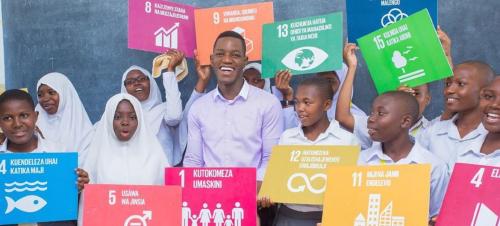Development financing crucial to get global economy back on track
The global economy is under severe stress and the Sustainable Development Goals (SDGs) are in “need of urgent rescue”, the deputy UN chief told the Financing for Development Forum on Monday.

Financing for development is needed to fully realize the 2030 Agenda for Sustainable Development and its 17 Sustainable Development Goals (SDGs).
“Financing for developing is an essential part of the solution,” Deputy Secretary-General Amina Mohammed said on behalf of the UN chief, adding that so far, the global response has fallen far short.
For this reason, the Global Crisis Response Group on Food, Energy and Finance was established to ensure high-level political leadership; get ahead of the food security, energy, and financing challenges; and implement a coordinated global response, she informed participants.
Development challenges
The President of the Economic and Social Council, Collen Vixen Kelapile, brought the attendees up to date on an increasing array of interrelated global crises that underline that no country, rich or poor, is immune to external shocks.
He elaborated that the SDGs are facing perhaps the “greatest threat” since their adoption. COVID-19 has exacerbated trends that are “contributing to cataclysmic effects” on development, he said, and the poorest and most vulnerable are impacted the greatest.
“Millions of people around the world have been pushed deeper into extreme poverty. Inequality is rising, and the gap between developed and developing countries is growing,” said the senior UN official.
Other pressing concerns
At the same time, he pointed to the impacts of carbon emissions on global climate, along with a geopolitical crisis that is driving refugee flows, causing severe disruptions on global supply chains for essential commodities, and also contributing to food insecurity in parts of the world.
Moreover, macroeconomic trends affecting least developed and low-income countries have been “dire”, according to Mr. Kelapile, who explained that while developed nations funded pandemic recovery by borrowing at low costs, developing States faced a cost of debt servicing barrier – limiting their ability to invest in infrastructure, housing, and social services.
More than half of these fragile countries are now in, or at risk of, debt distress, while many are experiencing slow economic recovery – in which estimates indicate that one in five will remain below pre-pandemic levels by the end of 2023.
These countries are compounded by continued hurdles in accessing vaccines, therapeutics and diagnostics – critical for ending the pandemic.
“In light of these complex challenges, international cooperation, global solidarity and multilateralism remain the surest way to solve these global challenges,” he stated.
The platform we need
Noting its universal participation, the ECOSOC president described the Forum as “the global platform we need to advance action on these challenges”.
As a Forum that “unites us”, and with a track record of “delivering consensus,” he called for an “ambitious outcome, that demonstrates the solidarity of Member States in these trying times.”
“It is only through urgent and coordinated action that we can mobilize the resources that will turn the trajectory around, lift people out of extreme poverty, prevent the worst effects of climate change, and achieve the Sustainable Development Goals,” he concluded.
Source:UN
- 216 reads
Human Rights
Ringing FOWPAL’s Peace Bell for the World:Nobel Peace Prize Laureates’ Visions and Actions

Protecting the World’s Cultural Diversity for a Sustainable Future

The Peace Bell Resonates at the 27th Eurasian Economic Summit

Declaration of World Day of the Power of Hope Endorsed by People in 158 Nations

Puppet Show I International Friendship Day 2020

